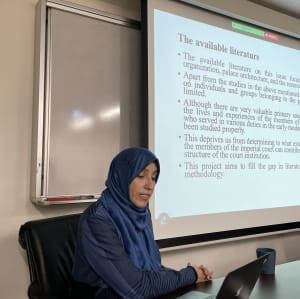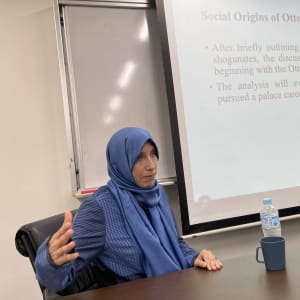Report
On August 27, 2025, the Tobuken Seminar "Social and Professional Profiles of Members of the Ottoman Imperial Court: A Prosopographic Study (1600-1789)" was held at the IASA. The seminar featured Professor Betül İpşirli Argıt from Marmara University, who visited the IASA through the JSPS invitational fellowship program. Ten participants attended in person and 15 participated online.
Professor İpşirli Argıt first outlined her new research findings regarding the social origins and recruitment and promotion patterns of male palace personnel at the Ottoman imperial court during the seventeenth and eighteenth centuries, based primarily on data from over 3,000 individuals collected from sharia court records. She then attempted a comparison with officials of the Tokugawa shogunate in Japan during the Edo period.
During the Q&A session, questions were raised about the most frequently-mentioned places of origin for the Ottoman palace-affiliated people, how patronage relationships could be discerned from the historical sources, and other related topics. Additionally, it was suggested that lower-ranking officials of the shogunate might be a more appropriate comparison than high-ranking ones such as Roju.
Event Details
Date and time: August 27, 2025 (Wed), 3pm~5pm
Venue: Institute for Advanced Studies on Asia, First Conference Room (304)/Zoom
Speaker: Betül İpşirli Argıt (Marmara University / IASA Visiting Researcher)
Title: Social and Professional Profiles of Members of the Ottoman Imperial Court: A Prosopographic Study (1600-1789)
Chair: Jun Akiba (IASA, U Tokyo)
Lecture abstract:
This research project focuses on the male palace personnel at the Ottoman imperial court who were positioned at several levels in various departments of the imperial palace organization in 1600-1789. It concentrates on the various aspects of their lives in order to construct their profiles and trace the changing patterns in an extensive span of time extending from the beginning of the seventeenth century to the end of the eighteenth century. This study examines the profiles and the personal experiences of palace-affiliated people from various angles. In particular, it will focus on the social origins of the examined group and their career strategies. The study will then incorporate a comparative perspective with the Japanese experience, taking into consideration the members of the Tokugawa shogun’s palace and the emperor’s palace in the Edo period.
*This seminar is supported by JSPS Invitational Fellowships for Research in Japan.


